Drinking Diet Pop While Pregnant
11 Beverages You Should Drink While Pregnant And 11 Beverages You Should Avoid
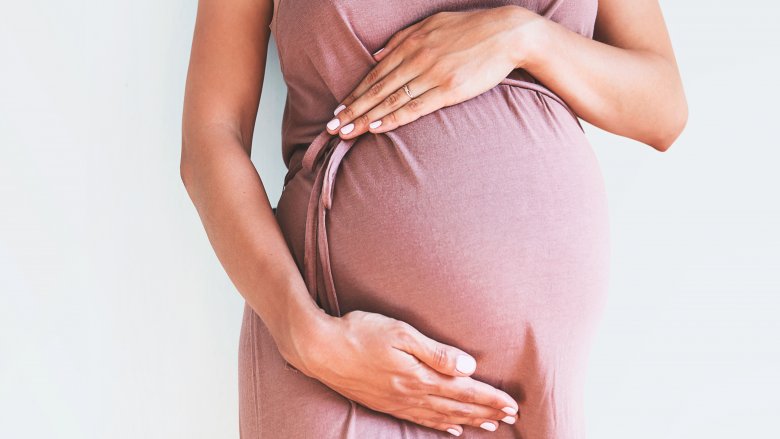
Shutterstock
There are so many things to remember during pregnancy. It can be complicated trying to keep track of how much exercise you're supposed to be getting, staying on top of your numerous doctor appointments, figuring out which kinds of medications and supplements you should or shouldn't be taking, deciding what to eat each day, and even learning what to drink — or, perhaps more importantly, what not to drink — over the course of nine months.
For every piece of guidance you've received about something seemingly as simple as drinking fruit juice to a glass of milk, you've likely had an array of contradicting opinions. Your close friends and family have probably already offered up tons of unsolicited — though likely well-meaning — advice about what worked for them during their respective pregnancies. It can get super confusing knowing who to trust and, while we advise you to consult your doctor before making any changes, science has shown us what is — and isn't — safe to drink during pregnancy. Here's everything you should know.
Drink: Water
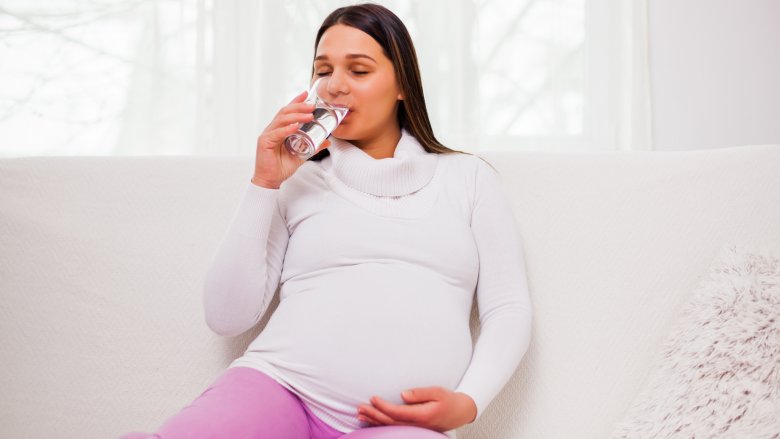
Shutterstock
Pregnancy aside, one of the most important things you should be drinking each and every day is water. However, if you are pregnant, drinking water becomes even more important than before. "The best choice when it comes to a drink for pregnant women is water," Natalie B. Allen, a registered dietitian and clinical instructor of dietetics at Missouri State University, told The List. This is because, as the expert explained, "The amniotic fluid needs to be replenished and water helps the baby in many ways." Water keeps your cells well-hydrated and just generally helps your body be as healthy as it can.
According to Healthline, pregnant women should drink about ten cups — 80 ounces — of water every single day. This is really only eight ounces more than is recommended for women who are not pregnant, but if you weren't an avid water-drinker prior to becoming pregnant, this might be more than you're used to. If you plan to breastfeed after giving birth, upping your water intake to the recommended level while pregnant will help prepare you for another increase. According to Healthline, breastfeeding women need to consume about 13 cups (104 ounces). So, drink up!
Avoid: Untested tap water
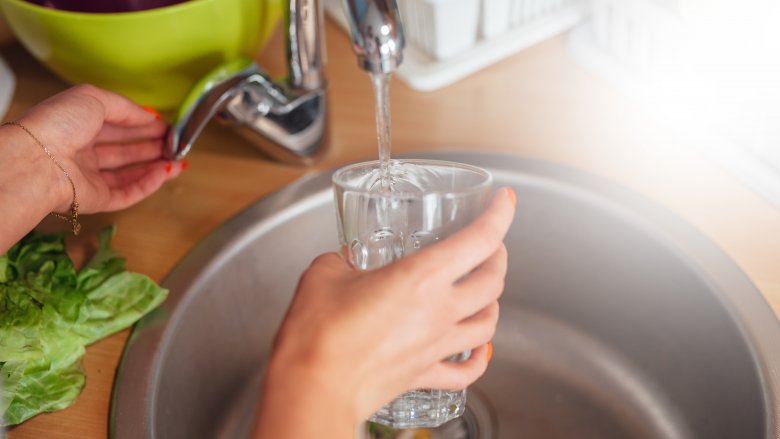
Shutterstock
There is one caveat to this whole upping your water intake business. Depending on the age of your home or apartment, your tap water may be passing through lead pipes. Consuming lead-laden water is not good for anyone, but pregnant women need to be even more cautious.
In an article for WebMD, Elizabeth Ward, a registered dietician and nutrition consultant, highlighted some of the risks. High levels of lead can cause low birth weight, preterm delivery, and developmental delays. You might think turning to bottled water to be your safest bet, but Ward explained that's not always true. Instead, having your tap water tested is advisable. But try not to worry if the test comes back showing trace amounts of lead.
Although ideally it would be great to remove all of the lead pipes in your home, water filtration systems have proven to be both effective at removing lead and — good news! — they're cost-effective. The Environmental Working Group advises purchasing a carbon-based filter that attaches directly to your faucet as "many pitcher filters are not certified to remove lead and do not work as well for this purpose."
Drink: Pasteurized and fortified orange juice

Shutterstock
Safe drinking water is the best thing you can drink while pregnant, but — let's be honest — sometimes you want something that's, you know, not water. Orange juice has been found to be a great choice for pregnant women. Be sure to choose an OJ that's been fortified with calcium as this is vital for bone health, registered dietitian Natalie B. Allen told The List. The citrusy beverage also contains potassium, which can help lower high blood pressure, a potentially dangerous condition in pregnant women.
Orange juice also works well when taken with your prenatal vitamin. The expert explained, "The Vitamin C in the juice will enhance iron absorption and orange juice also contains folate, which is important in neurological fetal development." Washing down your prenatal vitamin with orange juice is good for another reason.Medical News Today revealed that iron supplements can cause nausea. The Vitamin C in the juice not only enhances the absorption, as Allen explained, but also helps reduce queasiness. Before you run out to buy allthe OJ, you should make sure to choose one that is pasteurized as this will minimize the risk of any harmful food pathogens.
Avoid: Fresh-squeezed fruit juices
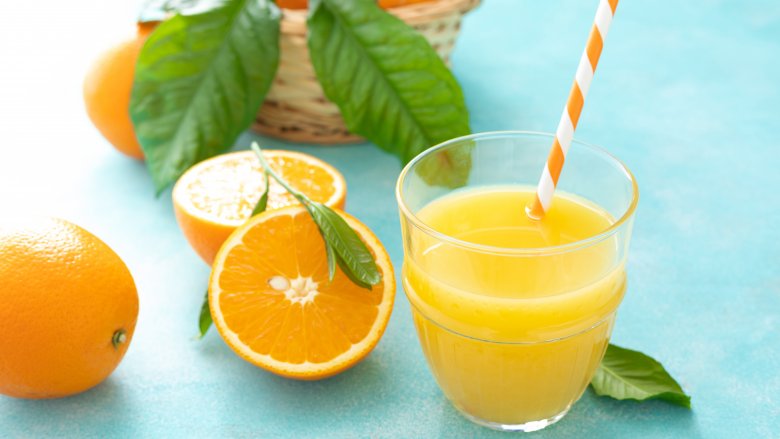
Shutterstock
You shouldn't have to search too hard to find orange juice that's been pasteurized. More than likely, any of the orange juice you find at the supermarket will have gone through the pasteurization process. This means that the juice was heated to a high temperature to kill any lurking bacteria and then cooled, making it safe to drink. Still, it's important to locate the word "pasteurized" on the label before purchasing.
You should also be wary of any juices — including orange — or ciders labeled "fresh-squeezed." While these beverages taste great, "fresh-squeezed" indicates that the beverage is unpasteurized. This means it can potentially be contaminated with dangerous bacteria such as E. coli, Elizabeth Ward, a registered dietician and nutrition consultant, explained in an article for WebMD.
Your safest bet is to only purchase pasteurized juice and cider. It's also wise to check with your friends, family members, and even the restaurants that you visit to make sure all are serving pasteurized juices too. Otherwise, you may just want to avoid fresh-squeezed juice and cider altogether.
Drink: Sports drinks with electrolytes
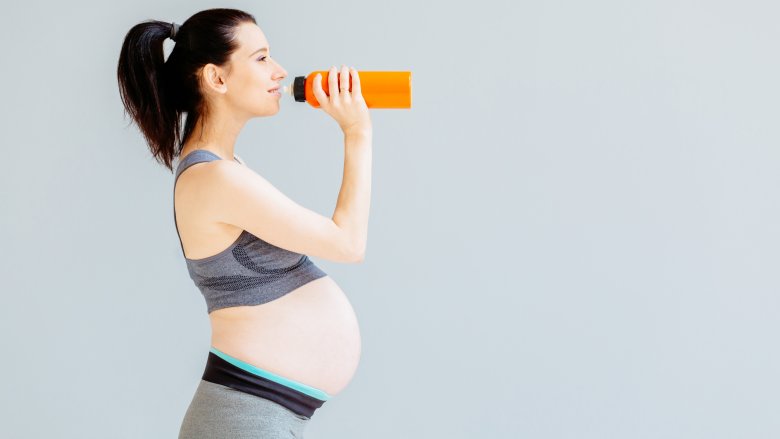
Shutterstock
It might seem odd to see sports drinks appear on the "should drink" side of this list. Nevertheless, sports drinks with electrolytes can be safely consumed during pregnancy. "Some moms may experience leg cramps during pregnancy," Natalie B. Allen, a registered dietitian and clinical instructor of dietetics at Missouri State University, toldThe List. "If this happens, try a sports drink, as the electrolytes and fluid will help alleviate the cramp." Michigan Medicine explained that electrolytes are a combination of minerals (including magnesium, potassium, calcium, and sodium) that help "keep the body's balance of fluids at the proper level."
Even for pregnant women who do not experience leg cramps, sports drinks fortified with electrolytes are a good choice. Complete Women's Care, a team comprised of board-certified OBGYNs and certified nurse practitioners, claims that sports drinks — "such as Gatorade, Powerade" — are one of the best choices for upping your fluid intake.
Avoid: Too many sugary beverages
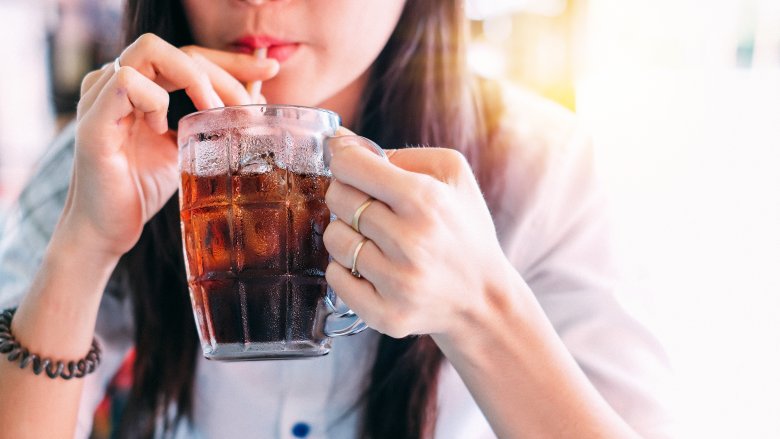
Shutterstock
Not all sports drinks are created equal. "Sports drinks often contain carbohydrates in the form of sugar, as well as electrolytes and minerals and sometimes protein, vitamins, or caffeine," wrote Michigan Medicine. Amos Grünebaum, an obstetrician and gynecologist specializing in high-risk pregnancies revealed that sugar is actually pretty safe during pregnancy. "Sugar can be consumed during pregnancy in moderation if you don't have Type I, Type II or gestational diabetes," he revealed in an article for BabyMed.
In good health, it's okay to consume sugar during pregnancy, but you may still want to consider monitoring how much you're drinking sugary beverages. That is, make sure you're not solely relying on sports drinks, or drinks with even higher amounts of sugar, to meet your fluid intake goal. Registered dietician Natalie B. Allen agrees that sugary beverages are not generally harmful to the baby, but she also pointed out that they're not all that nutritious either. Occasionally indulging in a sugary beverage is probably A-okay, but it's best to maintain balance and overdoing it throughout your pregnancy.
Drink: Pasteurized milk
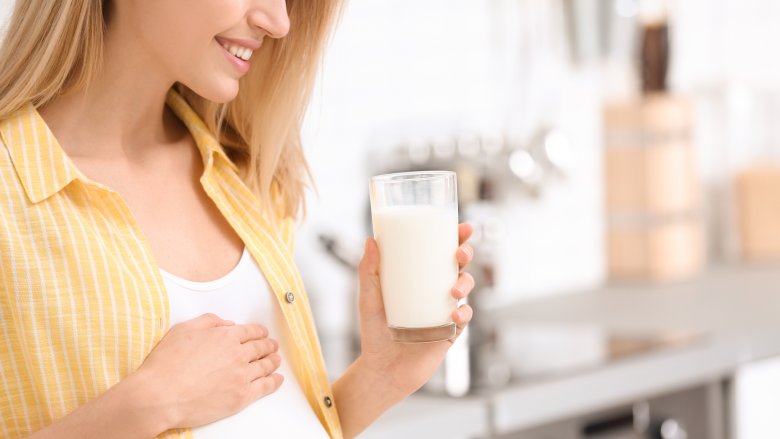
Shutterstock
Pasteurized milk is one of the best things an expecting mother can drink. "You can't beat dairy milk with its combination of protein, carbohydrates, and essential vitamins and minerals," registered dietician Natalie B. Allen told The List. "The baby's bones develop the most in the last trimester, so add a glass of milk daily, particularly as the pregnancy progresses."
The United States Department of Agriculture advises pregnant women to consume three cups of dairy products per day — but that doesn't necessarily mean whole milk. Registered dietitian Julie Redfern revealed in an article on Baby Center that drinking nonfat or low-fat milk can help you avoid unwanted saturated fat.
Amazingly, even if you had symptoms of lactose intolerance before conceiving, you might find that you're able to tolerate cow's milk now that you're pregnant. "For many women, the ability to digest lactose improves during pregnancy, especially later in pregnancy," registered and licensed dietitian Katherine Zeratsky revealed to Mayo Clinic readers. This means "you might be able to drink milk and eat other dairy products without discomfort." For expecting mothers who wish to avoid drinking cow's milk, though, soy milk is a viable alternative. "Just be sure to choose brands that have added calcium," Redfern noted.
Avoid: Raw milk
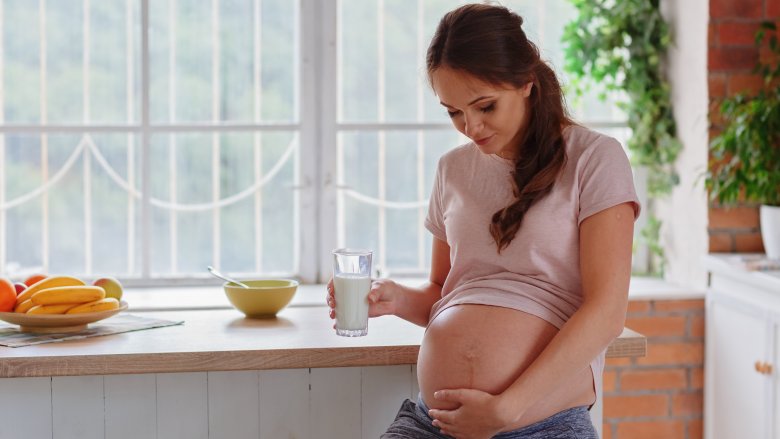
Shutterstock
Although raw milk is seeing a bit of a movement, the United States Food and Drug Administration advises everyone to avoid consuming it. But what exactly is raw milk anyway? According to the FDA, raw milk is "milk from cows, sheep, and goats — or any other animal — that has not been pasteurized to kill harmful bacteria." This means it can carry "dangerous bacteria such as Salmonella, E. coli, Listeria, Campylobacter, and others that cause foodborne illness, often called 'food poisoning.'"
Though the bacteria found in raw milk isn't good for anyone, it can be especially dangerous for pregnant women. Listeria bacteria can cause an infection called listeriosis and, according to genetic counselor Sara Riordan, pregnant women are "particularly susceptible." Listeriosis can "be devastating and even deadly for unborn babies," Riordan explained.
While the government has banned the sale of raw milk in the United States, raw milk is legal in other parts of the world. You'll want to watch out for this while traveling abroad and, if someone does happen to offer you raw milk in the states, steer clear. It's not worth the risk.
Drink: Herbal tea
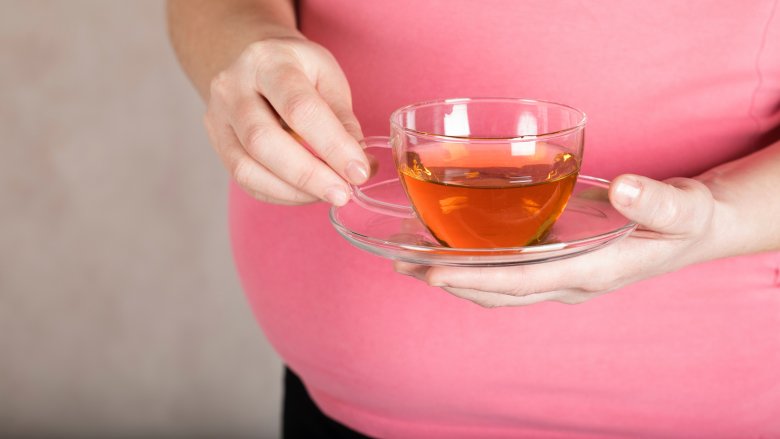
Shutterstock
"Herbal teas can help hydrate the body when women don't want to drink plain water," Amelia Hirota, a Rhode Island-based herbalist and acupuncturist, toldParents. Plus, they have plenty of added benefits.
Rooibos tea is full of antioxidants and is completely caffeine-free, making it a great choice for pregnant women. Ginger and peppermint teas can help reduce the symptoms of morning sickness. According to the American Pregnancy Association (APA), lemon balm tea has been found to have a calming effect on drinkers. Red raspberry leaf tea can even help you when it comes time to push. "Many midwives believe that drinking red raspberry leaf tea during pregnancy tones the uterine muscle, which may help make contractions more efficient," Hirota explained. The APA revealed that this tea has also been found to prevent expecting mothers from delivering too early or too late.
You shouldn't drink just any ol' herbal tea, though. According to the APA, herbal teas can be unsafe if they "are not made commercially," made with "excessive amounts of herbs (amounts larger than those found in common foods or drinks)", or "made with herbs that are known to be toxic."
Avoid: Caffeinated tea and coffee
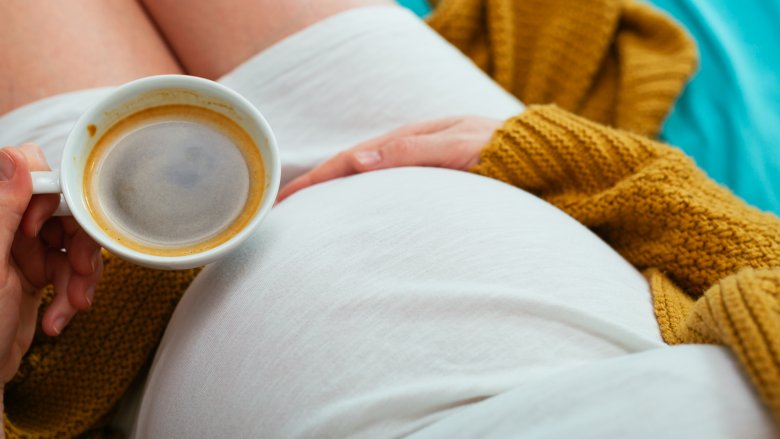
Shutterstock
For some, it can be hard to picture going nine months without a cup of coffee or strong, black tea. Though, you don't actually have to give up caffeine in its entirety. According to the American Pregnancy Association (APA), moderate levels of caffeine — anywhere from 150 to 300 milligrams (about two 8-ounce cups of coffee) per day — have not been linked to any negative effects on pregnancy. However, it's important to remember that it's not just coffee and tea that contain caffeine. Chocolate, soda, and even some types of medicine contain the stimulant. It can be easy to go well over 300 milligrams without even realizing.
Of course, you may choose to play it safe and do without caffeine altogether. In fact, the APA says that "avoiding caffeine as much as possible is your safest course of action." This is partly because an unborn baby is incapable of metabolizing caffeine the way an adult can. "Even a small amount of caffeine can cause changes in your baby's sleep pattern or normal movement pattern in the later stages of pregnancy," the APA cautioned.
Drink: Smoothies
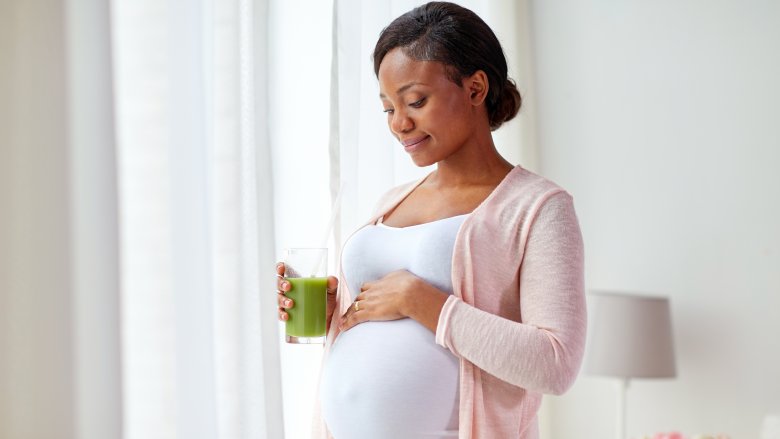
Shutterstock
There may be few things more enjoyable than slurping down a giant, ice-cold smoothie — especially if you happen to be in your third trimester — in the heat of summer. Fortunately, smoothies are perfect for pregnant women. Parents reported that 70 percent of the women they surveyed admitted to making healthier diet choices when they became pregnant. However, only 37 percent were meeting the recommended five to nine servings of fruits and veggies per day. Some weren't big fans of healthy foods prior to becoming pregnant, while others found their taste for it had changed during pregnancy. "I try to eat healthy, but vegetables do not sound good to me right now," expecting mother Sarah Prince of Salt Lake City told the publication. "I may have a few servings of fruit a day, but only one and sometimes zero servings of veggies."
Smoothies, however, are an easy and delicious way to consume more fruits and vegetables. "There's something about the combo of liquid and cold. Women tolerate smoothies better than, say, spinach omelets," registered dietitian nutritionist Tamara Melton explained. Just be sure to balance your smoothie with greens and not just fruit.
Avoid: Unpasteurized eggnog

Shutterstock
While it may be your favorite way to partake in the holiday cheer, unpasteurized eggnog — especially of the homemade variety — should be avoided during pregnancy. You may not have paid much attention to the name before you were pregnant, but eggnog is, well, exactly what it sounds like. Egg yolks, whole milk, heavy cream, and sugar are the main ingredients of this sweet wintertime refreshment. Some recipes even call for whipped egg whites.
Due to the raw eggs, foodsafety.gov advises against unpasteurized and homemade varieties of the nog. Raw eggs can,as we all know, contain salmonella. Although literally no one would enjoy having salmonella, pregnant women should be especially cautious. In some instances, salmonella can lead to sepsis, a sometimes fatal blood infection. Rarely, salmonella can also cause miscarriages or preterm birth.
However, you can definitely make safe-to-consume eggnog by cooking it to at least 160 degrees Fahrenheit. Or, if you're more of a store-bought eggnog fan, you can buy one labeled "pasteurized" to avoid any risk of salmonella.
Drink: Lemonade

Shutterstock
If you're not pregnant during the winter months, lemonade or lemon water are refreshing and healthy beverages during pregnancy. In fact, the American Pregnancy Association (APA) says that just "sniffing" lemons can "help ease the feeling of nausea" associated with morning sickness. This is one reason why the APA is on board with expecting mothers drinking lemonade.
Lemonade is also mostly water and, as Eleana Kaidanian, a registered dietitian, told BabyCenter, "Water is the best source of hydration." Though, some women who experience morning sickness have trouble drinking water without becoming nauseated. Infusing water with lemon or mixing up some lemonade will not only make the water more appealing, but as the APA revealed, the lemons themselves will work to reduce nausea. Of course, you'll just want to make sure you're not consuming lemonade with tons of added sugar and you'll want to make sure your lemonade contains, you know, real lemons.
It is true that fresh-squeezed lemons can pose the same risk as other fresh-squeezed juices. However, washing the outside of the lemons will get rid of any stubborn bacteria. Alternatively, you can boil your lemonade and then cool it prior to drinking.
Avoid: Alcohol

Shutterstock
"I drank alcohol when I was pregnant and my baby turned out just fine." You may have heard this story, or a story like this, time and time again throughout your pregnancy. It's hard to know what to believe when it comes to alcohol consumption during pregnancy. So, what's the truth?
The American Academy of Pediatrics is clear. According to a 2015 report, "no amount of alcohol intake should be considered safe; there is no safe trimester to drink alcohol; all forms of alcohol, such as beer, wine, and liquor, pose similar risk; and binge drinking poses dose-related risk to the developing fetus." As of this writing, there is absolutely no level of drinking during pregnancy that has been deemed safe. While it may sound relaxing to unwind with a glass of rosé here or there, the risks — from developmental disorders to birth defects — are "completely preventable" if you avoid any and all alcohol consumption during your pregnancy. Let's agree to pop the bubbly after baby is born.
Drink: Kefir
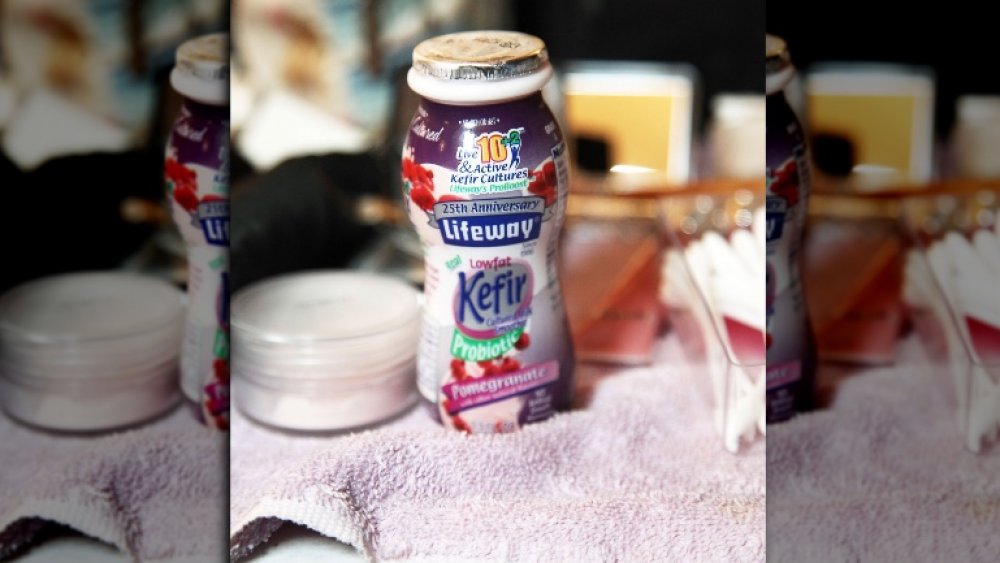
Donald Bowers/Getty Images
Probiotics are not only safe to have during pregnancy, but they may even be beneficial. A study referenced in the BMJOpen revealed that pregnant women who consume probiotics might be at a reduced risk for premature birth and preeclampsia. Additionally, as of this writing, the American Pregnancy Association states that there "does not appear to be any risk of probiotic use for expecting, or lactating, mothers."
Thankfully for moms-to-be, getting probiotics is as easy as drinking a smoothie-like beverage. Kefir, a naturally probiotic-rich fermented milk beverage, is an excellent source of these microorganisms and are considered by many to be safe for pregnant women to consume.
Registered dietitian nutritionist Ryann Kipping told Insider she recommends pregnant women consume probiotics three to four times per week by drinking kefir and/or eating foods like sauerkraut and yogurt. "A healthy balance of bacteria equals better outcomes for both mom and baby," she explained.
Avoid: Kombucha
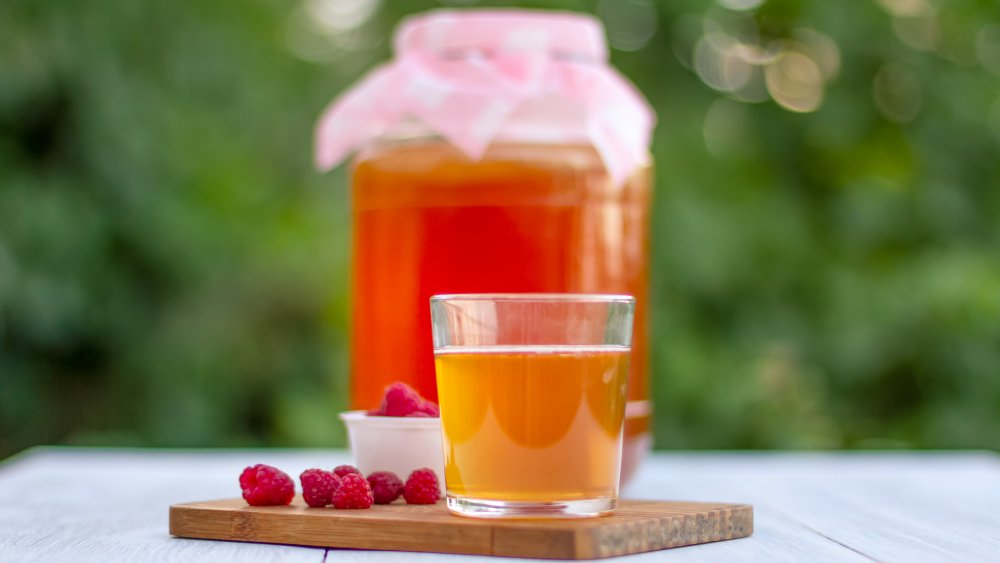
Shutterstock
Kombucha is a bubbly and fermented tea drink that many people love to sip. It also happens to be considered a wellness beverage as it has myriad of health benefits. However, it is recommended that pregnant women avoid drinking it. There's a few reasons for this.
While kombucha is not labeled as an alcoholic beverage, it does actually contain minimal amounts of alcohol — up to 0.5 percent — according to Healthline. Although that may not sound like much at all, any amount of alcohol could be harmful to a developing fetus, the American Pregnancy Association states. Additionally, kombucha is made with caffeinated tea and, as Healthline noted, "Caffeine is a stimulant and can freely cross the placenta and enter a baby's bloodstream." Lastly, most types of kombucha are unpasteurized, which means certain types of bacteria that are harmful to pregnant women, like listeria, could be lurking in the bottle.
Drink: Bone broth
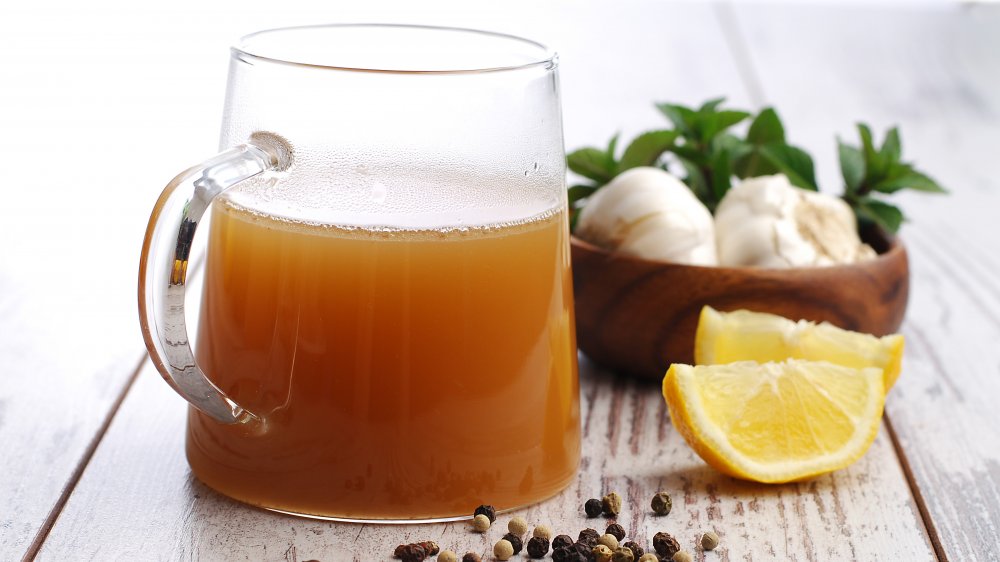
Shutterstock
In mid-March 2020, Katy Perry took to Twitter, revealing that she was drinking bone broth to support her immune system. And earlier that month, the singer revealed she was expecting her first child with fiancé Orlando Bloom. Hmm. Now, while not every product a celeb endorses is actually going to be good for you, it turns out that bone broth is indeed something women should consider drinking during pregnancy, especially if they're dealing with morning sickness.
The American Pregnancy Association recommends a diet of bland foods, including broth, to ease nausea. Holistic chef Minna Hughes agrees. "Broth is a good way to keep up your nutrient intake when you're feeling unable to eat," she explained to Well+Good. As for what kind of broth, she's a fan of ones made from "grass-fed beef bones." She continued, "This is an easy way to consume the minerals in bone marrow."
Avoid: Diet soda

Shutterstock
Is there anything wrong with having a Diet Coke during your pregnancy? While registered dietitian Melinda Johnson revealed in an article for BabyCenter that the "occasional soft drink is not likely to do you any harm," pregnant women should not drink either regular or diet soda with any regularity.
If you're wondering if it's because of the caffeine, that's only part of the problem — and one that can be solved by opting for a caffeine-free soda. The unavoidable issue with the beverage, however, is the sweetener. A study by the Department of Pediatrics and Child Health at the University of Manitoba in Canada that was published in JAMA Pediatrics in 2016 suggested that consuming artificial sweeteners while pregnant could lead to infant obesity. Johnson also pointed to a comprehensive study showing that women who drank either artificially sweetened beverages (like diet soda) or beverages with sugar (like regular soda) each day had an increased risk of going into preterm labor and delivery.
Drink: Coconut water
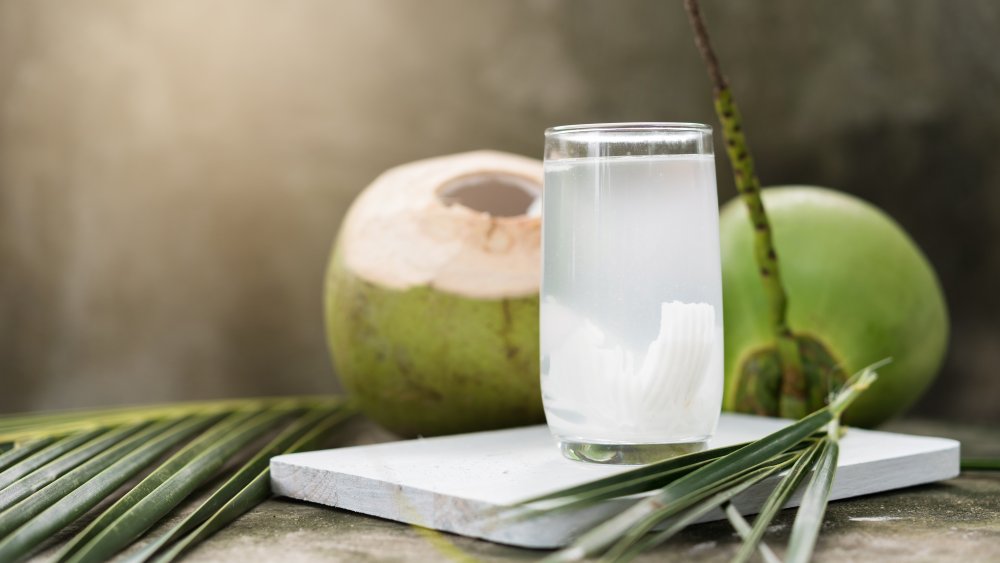
Shutterstock
Coconut water is recommended for pregnant women because, for one thing, it can ease the symptoms of morning sickness, according to aFirstCry Parenting article that was medically reviewed by Sabiha Anjum, an obstetrician-gynecologist. The article noted that coconut water is also an excellent substitute for sugary drinks and can even boost your energy because it contains phosphorous, among other minerals.
"The best time to drink coconut water during pregnancy is in the morning, as the nutrients and electrolytes it contains are easily absorbed on an empty stomach," FirstCry Parenting reported. "It is rich in potassium, sodium, dietary fibre, moderate sugar, vitamins, and protein" — all of which are great for curbing dehydration and morning sickness.
It is important to note, though, that coconut water can lower your blood pressure, so you may want to consult your doctor. FirstCry Parenting further recommended that pregnant women limit their consumption of coconut water to one serving a day to "prevent an overdose of sodium or potassium." While coconut water is well worth adding to your diet — especially in your third trimester — moderation is important.
Avoid: Wheatgrass juice or shots
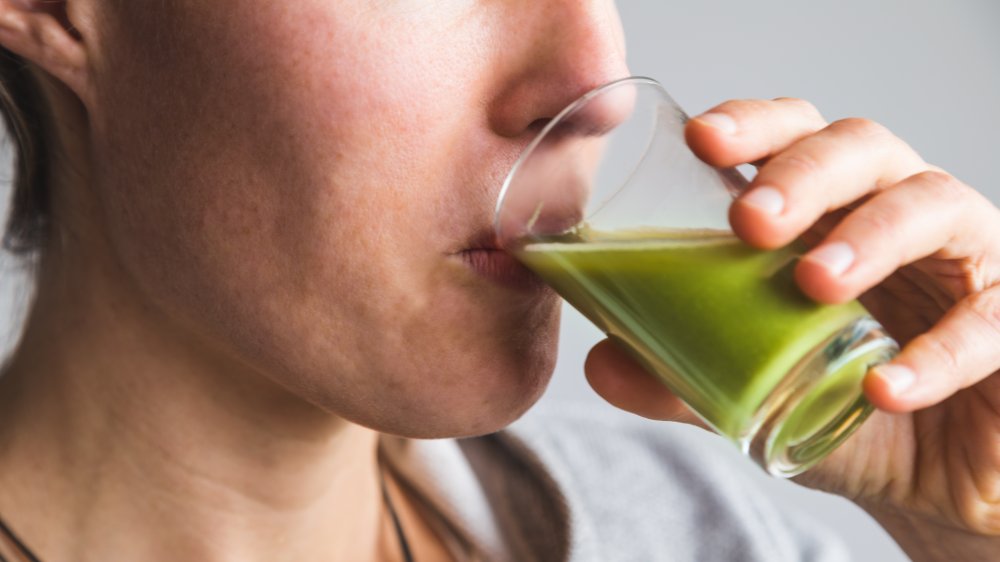
Shutterstock
Wheatgrass is full of vitamins, minerals, essential amino acids, antioxidants — the list goes on and on. It's no wonder pregnant women would consider adding some wheatgrass juice or wheatgrass shots to their diet. However, this arguably healthy beverage can also present some dangers.
"Wheatgrass is usually grown in soil or water and consumed raw, which means it could be contaminated with bacteria or mold," Brent A. Bauer, director of the Department of Internal Medicine's Complementary and Integrative Medicine Program for Mayo Clinic, wrote for the organization. "If you're pregnant or breast-feeding, don't use wheatgrass."
Research has also demonstrated a possible connection between consuming wheatgrass and miscarriages, sports nutritionist and dietitian Deepshikha Agarwal explained to The Health Site. Agarwal also noted the potential for causing "an impairment in the baby." So, while the drink may have numerous benefits, it's safest to wait to add it to your diet until after your baby is born.
Drink: Healthy mocktails
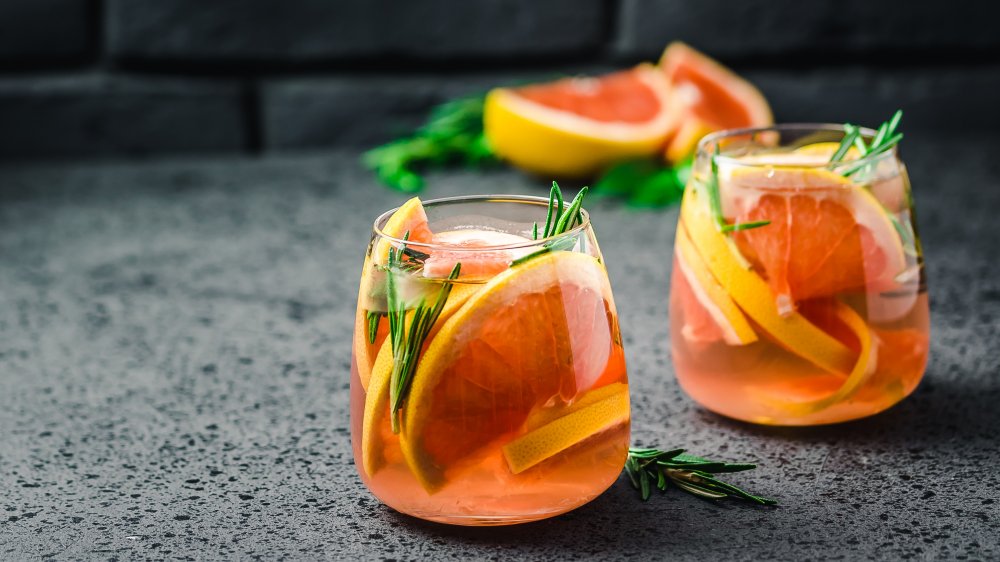
Shutterstock
If you were one to drink socially before your pregnancy, you may find toasting with a glass of water to be blasé. Yes, there's bound to be a moment within those nine months that you wish you could pull a modern-day miracle and turn that seltzer into champagne. And that's where mocktails come in to save the day. If you've been avoiding making yourself one of these bad boys due to the sugar content, there are ways around that. In fact, they can even be healthy.
"As a nutritionist, I recommend DIY mocktails made with ingredients that nourish you during pregnancy and help support baby's development," registered dietician Cynthia Sass penned in an article for What to Expect. The expert provided recipes, such as those for the Pomegranate Cosmo and Pina Mocklada, that include vitamins and minerals to both satisfy tastebuds and benefit your growing baby. Some, like the Mango Mint Quencher, can even help quell nausea, which we all know is something a regular ol' cocktail could never do.
Avoid: Energy drinks
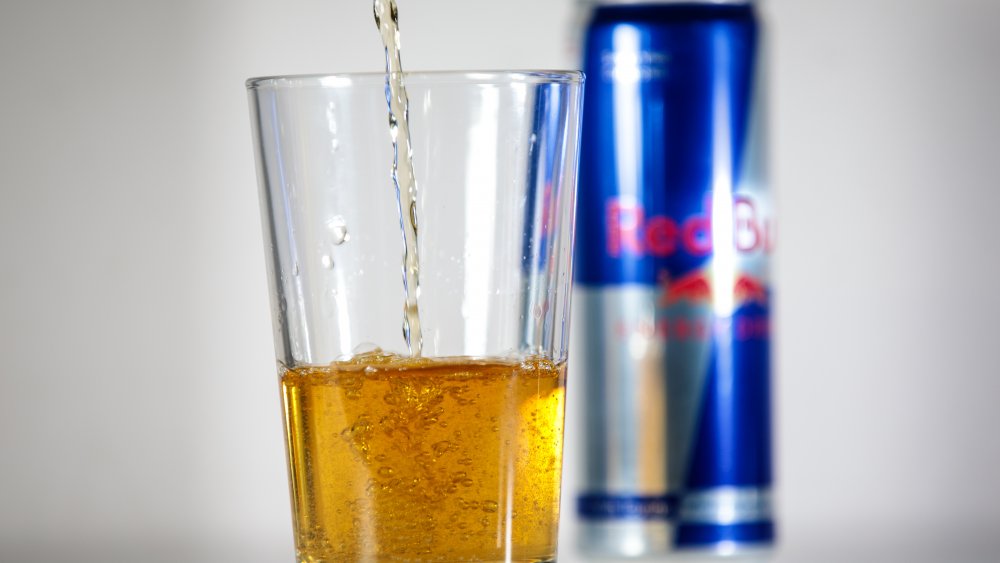
Jack Taylor/Getty Images
Fatigue is a very real — and very common — issue during pregnancy, especially during the first trimester. Finding ways to stay awake can be challenging and may have you considering popping open a can of Red Bull. Experts, however, would beg you to reconsider.
Emily Mitchell, a dietitian at the Center for Fetal Medicine in Los Angeles, Calif., told Verywell Family, "Energy drinks are not recommended during pregnancy as they may contain high levels of caffeine, and other ingredients not recommended for pregnant women." She continued, saying, "Energy drinks are also not regulated by the FDA as they fall into the category of food supplements. Supplements are not regulated and may contain ingredients that are not listed in the label."
Although an energy drink may seem like an easy solution for your tiredness, it's far safer and even more effective to eat foods that are naturally energizing, like peanut butter and avocado, and to take up exercising regularly. And by all means, sleep! It's good for both you and your baby, experts told Shape.
Drinking Diet Pop While Pregnant
Source: https://www.thelist.com/77249/7-beverages-drink-pregnant-7-beverages-avoid/